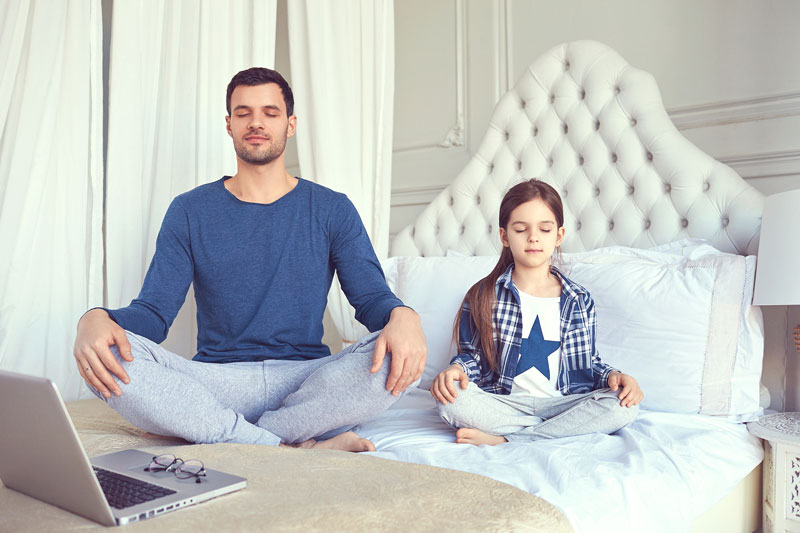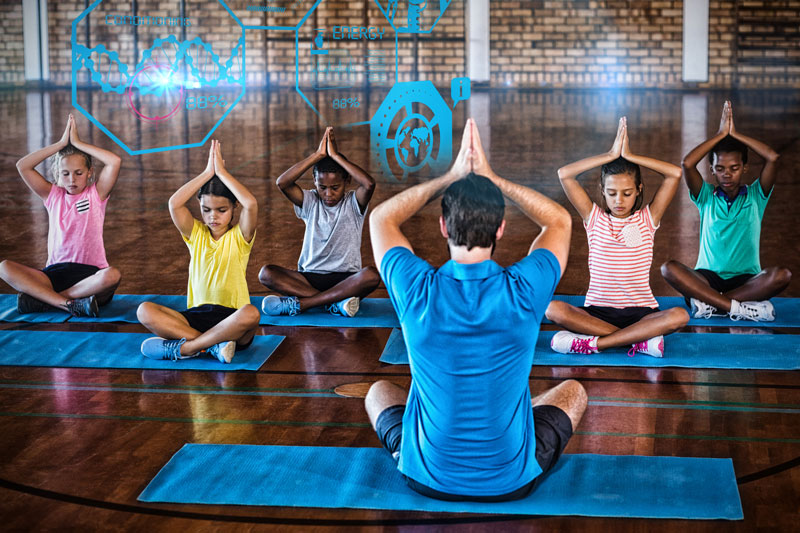Mindfulness made its first real appearance in America in 1979 when Jon Kabat-Zinn started his Mindfulness-Based Stress Reduction Program (MBSR) at the University of Massachusetts Medical School. He was first introduced to the ideas while he was studying at MIT to earn his Ph.D. in molecular biology.
He untangled the practice from its religious roots and put it into a solidly scientific context. He believed we shouldn’t practice meditation because it brings us closer to God or makes us “more aware of our unconscious.” We should do it because it works.
Mindfulness and other types of meditation have become increasingly popular in the past decade because Kabat-Zinn was right. Not only has his program been validated as effective in coping with stress, pain, and illness, but positive psychologists and neuroscientists have confirmed that it produces positive results in our general well-being.
The Science Behind Good Leadership Qualities
Feeling good is fantastic, but vague. You need criteria for whether a practice is going to benefit you personally, as a father and as a CEO. Your ability to make decisions manage stress and focus is fundamental in both roles.
Decision-making abilities: Meditation tones down your emotional reactions. One study took fMRIs (functional Magnetic Resonance Imaging) of participants engaging in an ultimatum game and found that non-meditators called upon parts of their brain associated with disgust and other strong emotions. Their meditating counterparts activated networks that allowed them to uncouple negative emotions from behaviors and make more rational decisions.
“Meditation helps develop your abilities to focus better and to accomplish your tasks.”
Robert Stiller, CEO of Green Mountain Coffee Roasters, Inc.
That’s why there is a dedicated meditation room at the company’s headquarters in Vermont.
Focus: Your ability to focus is your ability to provide clear direction to your family and subordinates. Meditation strengthens this ability by stabilizing the ventral posteromedial cortex—the part of your brain associated with spontaneous thoughts. This minimizes recurrent negative thoughts, allowing you to keep your attention on the task at hand rather than lay blame or engage in criticism.
Bob Roth, CEO of the David Lynch Foundation, says he teaches Transcendental Meditation because it “increases clarity, focus, and resilience.”
Manage stress: Perhaps more than any other benefit, father CEOs need to meditate for stress reduction. Your stress response is constantly triggered at work and at home, increasing your blood pressure, wreaking havoc on your sleep, and weakening your immune system. Meditation reverses all these effects, allowing you to do your job more effectively and to respond to your family with care rather than react with anger. Keeping your temper in check will allow you to see your grandchildren born rather than succumbing to the early death associated with severe stress.
"Part of the key to time management is carving out time to think, as opposed to constantly reacting.”
Jeff Weiner, CEO of LinkedIn

Source: iStock
Inspiring Others is One of the Good Leadership Qualities
These skills serve you well in every area of life, regardless of whether you are a CEO, a father, a filmmaker, or a teen. These are soft skills that are hard to develop and maintain but foster high achievement for a lifetime. That’s why your children should be building them, too.
What better way to kill two birds with one stone than to have a meditation practice with your children?

Actually, three birds. Participating in meditation together will help you and your child build skills fundamental to success and it will help you build a strong, long-lasting, and fulfilling bond with them that will easily weather the storms of life.
Two key components of meditation are being present and being non-judgmental. These are the exact states you need to be in to meet someone where they are, instead of where you wish they were.
This is essential during the teen years when tensions run high. If you don’t find a way to keep your stress in check, you’ll respond with anger and damage your relationship with your child at a crucial time in their lives.
Getting Started

Source: iStock
You’re convinced that meditation will help you cultivate good leadership qualities. You see how it can strengthen your children and how it can help you grow a stronger bond. You are ready to get started.
Ages 3-7: Fathers of young children, you might have to sit this one out. While you can begin to teach mindfulness techniques to your kids, they will predominantly have to be taught. Consider finding a meditation podcast aimed at this age group.
Ages 8-12: Children this age are generally enthusiastic to engage in whatever their parents are interested in. They are moving from “exploring” to “exploiting” the world and are happy to learn practical skills. Consider sitting back-to-back during meditation. Physical contact increases feelings of love and trust. Trying to breathe in concert with you will focus your child’s attention.
Ages 13+: As they enter the teens, your children are more and more interested in their peer group. Clue them into any celebrities they know that meditate. Give them some power over the practice. Ask them what they’re struggling with and find the type of meditation that can help them with that issue.
As your relationship with your teenager evolves, misunderstandings are bound to pop up. Creating the space and time to touch base with each other in the right state of mind will stop both of you from saying and doing things you’ll later regret.
Get started with a guided meditation. When you are just beginning, instruction will be helpful.
Whatever their age, don’t get caught up on how to bring your kids to the proverbial table. Not everything has to be a drawn-out discussion. Tell them you want them to try something new with you and bring them to do it, whether in a studio, a nearby park, or the backyard.
From managing stress to making you a more rational decision-maker, meditation will make your house and office more peaceful environments where those in your care can flourish.











